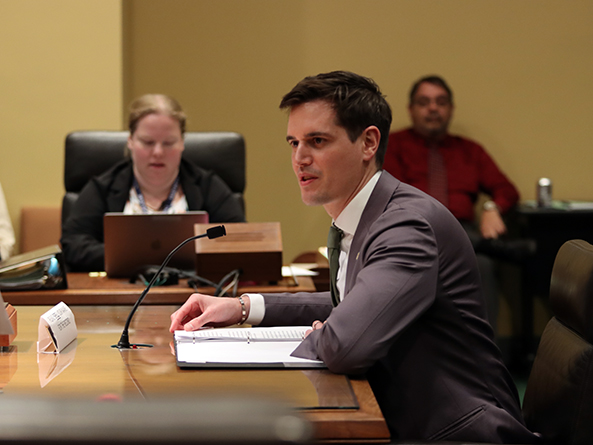Bill would redirect ARPA funds to behavioral health provider support
The Appropriations Committee heard testimony Feb. 20 on a bill that seeks to repurpose unused federal American Rescue Plan Act funds to provide training and support opportunities for behavioral health students and professionals.

In 2022, the Legislature appropriated $2.5 million in ARPA funds to the state Department of Health and Human Services to be used to increase the number of behavioral and mental health beds in rural Nebraska.
Omaha Sen. John Fredrickson, sponsor of LB931, said the department returned those dollars because the funding was insufficient to increase capacity in the way intended. He said the dollars now could be used to increase access to behavioral health services by providing internships, practicums and fellowships for graduate and postgraduate students in behavior health programs.
The bill would re-appropriate the $2.5 million to the University of Nebraska Board of Regents to be used for Behavioral Health Education Center of Nebraska initiatives.
BHECN received $25.5 million in ARPA funds from the Legislature last year to support individuals pursuing degrees in behavioral health, Fredrickson said, but was able to fund only 30% of the 344 applications it received.
“It is important to ensure that the $2.5 million in unused dollars from DHHS continue to go towards behavioral health as intended,” he said.
Under the bill, $1 million would be used for BHECN stipends and supervision of behavioral health trainees to ensure successful completion of their degree programs. Another $1 million would be allocated to provide support for provisionally licensed behavioral health providers and the remaining $500,000 would be used for recruitment and retention efforts.
Erin Schneider, deputy director of BHECN, testified in support of the proposal on behalf of the University of Nebraska System.
Schneider said BHECN has distributed ARPA funds to more than 100 projects throughout the state but currently is unable to meet the demand. For example, she said, Northeast Community College’s stipend program for licensed drug and alcohol counselors received enough qualified applicants in the first semester to expend all of their allotted funding for the next three years.
“The reappropriation of these funds has the potential to develop, recruit and retain hundreds of behavioral health providers in the state and ultimately meet Nebraska’s growing behavioral health needs,” Schneider said.
Also speaking in favor of the bill was medical student Tony Le, who said BHECN was integral to his decision to pursue psychiatry. The center helped him become a competitive applicant for residency programs, Le said, and more funding would help BHECN address the state’s behavioral health provider shortage by doing the same for other students.
No one testified in opposition to LB931 and the committee took no immediate action on it.


